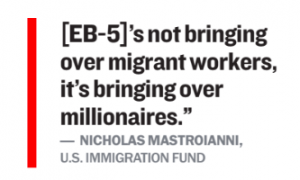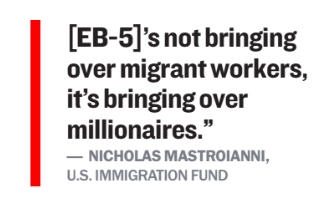In early 2013, a press release for an upcoming luxury high-rise in New Jersey was blasted out to investors more than 6,000 miles away.
Aimed at wealthy Chinese seeking a life in America through the EB-5 visa program — green cards awarded to foreign nationals in exchange for investments in job-creating projects — the release cited Jersey City’s demand for upscale rentals at prices set well below the Manhattan market. Kushner Companies [TRDataCustom], the developer of the $218 million project later christened Trump Bay Street, would begin construction on the 50-story tower the following year if enough capital was raised.
Translated into English, the pitch in Chinese urged potential immigrant investors to “understand that the company president Charlie Kushner is the son-in-law of the famous New York real estate tycoon Donald Trump!” Charles Kushner is, of course, the father of that son-in-law, Jared Kushner — the property heir who married President Trump’s daughter Ivanka and now serves as a senior White House adviser. But that mix-up mattered little, and the Trump-branded project, which held its grand opening in November 2016, raised $50 million from EB-5 investors alone.
The federal program is now at a crossroads (again). A growing number of investigations and lawsuits focused on fraud has rocked the EB-5 market, and some lawmakers in Washington feel increasingly skeptical that money flown in from overseas is properly vetted before it reaches developers’ pockets.
Shortly before President Barack Obama left office, the Department of Homeland Security proposed a series of reforms to the visa process to combat these and other follies of EB-5. The rule changes would dramatically raise the minimum investment amount required to obtain a visa, to $1.35 million from $500,000, and would bring the oversight of targeted employment area (TEA) creation more completely under the purview of the federal government. Furthermore, if Congress does not reauthorize or temporarily extend the expiring program, it will sunset by the end of April.
Despite Trump’s latest machinations limiting foreign entry to the United States, his and Kushner’s recent business usage of EB-5 has developers, lobbyists and liaisons optimistic that the program will be saved. Several of the proponents also favor reforms set on rooting out dirty money and investment malpractice.
“We believe the EB-5 program fits nicely into the Trump administration’s job-creation goals, and we have every reason to think that they will use the program aggressively,” said Angelique Brunner, who owns five EB-5 regional investment centers across the country and lobbies through the EB-5 Investment Coalition.
 The current proposal to raise the investment thresholds, however, “will kill the program,” she said.
The current proposal to raise the investment thresholds, however, “will kill the program,” she said.
“If Trump’s going to be strong on deporting illegal immigrants, I think it’s good for the EB-5 market,” said George Xu, a Chinese-American developer who operates the Century New York City EB-5 regional center in Flushing, Queens. “That’s because if you cannot get here illegally, you have to find a legal way.”
Kimble Ratliff, the EB-5 lobbying specialist for the National Multifamily Housing Council, an influential real estate group in Washington, said he and his colleagues have “not had those conversations with the administration yet,” but that the organization is hopeful.
“My impression so far is that this administration is focused in a sort of nonpartisan…way on job creation, and with that in mind, the prospects for EB-5 are good,” Ratliff told The Real Deal.
Even if Trump directed the Department of Homeland Security to punch the minimum investment thresholds back down, there is still the problem of Congress needing to reauthorize EB-5. Advocates believe the president will support such a move, while others on the Hill are increasingly calling for the program’s death.
Democratic Sen. Diane Feinstein of California and Republican Sen. Chuck Grassley of Iowa recently introduced a bill that would do away with the visas for good. In a statement last month, Grassley urged colleagues to “take the necessary steps to wind down the program and completely mitigate fraud, abuse and threats to our security.” He even took a jab at the lobbyists: “EB-5 proponents are apparently content with the status quo, and that’s unacceptable.”
The president could direct the DHS to retract its proposed tightening of the EB-5 program today if he wanted to. But if being “tough on China”— as Trump has vowed — also means being tough on EB-5, continued silence from the administration could signal an unwillingness to take too strong a position. And it could prove difficult to harmonize a pro-EB-5 pulpit with other immigration and China-policy moves.
Nicholas Mastroianni, whose business acted as conduit for the $50 million in EB-5 financing for Trump Bay Street, isn’t concerned, however.
“I don’t think they’re going to criticize the program in any way,” Mastroianni, founder of the U.S. Immigration Fund, told TRD. “It’s not bringing over migrant workers, it’s bringing over millionaires.”
